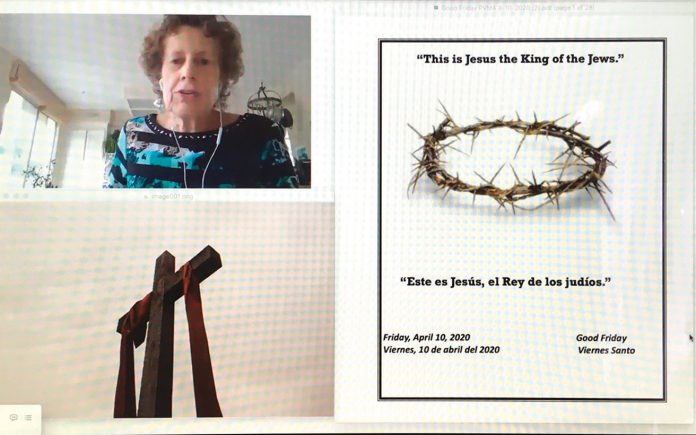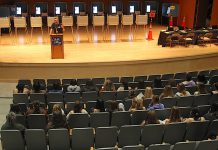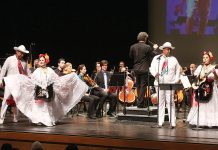
SANTA CRUZ COUNTY—While scores of agencies and organizations, from food banks to senior centers, grapple with the ongoing COVID-19 pandemic, area faith groups are also finding new ways to redirect their message.
Online services, thanks to live streaming, Zoom and live chats, are now taking the place of indoor congregations, in-person mass and even funerals.
“We are fortunate because we have a member who is a teacher who works with online learning and, thanks to Zoom, we were up and running a day after shutdown,” said Deacon Patrick Conway, of Resurrection Catholic Church in Aptos. “Zoom lets us live stream our services. We pulled it off and we’ve been doing it ever since.”
Now Resurrection Church offers such services at 10 a.m. Tuesday through Friday, and at 10 a.m. on Sunday they live stream mass.
Roughly 500 people visit them online each day, Conway said. They had 800 visitors on Easter Sunday.
“In addition, we are getting a steady stream of email—like around 1,000 a day—and we’re keeping up with getting out our news of the day, and reaching out with prayer,” Conway said. “They’re used to going to mass each Sunday. So now, through the online services, they can feel connected. Some folks right now feel a lot of stress being shut in at home.”
Additionally, Resurrection Church has now set up a shelter for 13 homeless people, with the potential to expand thanks to grants from County officials, Conway said.
“We believe this is part of being a good Christian and being a good human being,” Conway said.
For years now, the church has served as a food distribution site for Second Harvest Food Bank. They are now offering that service every Monday and Friday from 10 a.m. to noon.
“We are basically a poor people’s grocery store, only it is free,” he said.
Historic Watsonville church adapts
Pastor Robin Mathews-Johnson of Watsonville First United Methodist Church (FUMC) has, along with her tech team, also adapted, moving services online every Sunday at 10 a.m. through its Facebook and YouTube.
“We were founded [in Watsonville] in 1852… This is the first time in our history we’ve worshiped virtually,” Mathews-Johnson said. “It’s been a growing process. It’s been challenging, but exciting too.”
On Good Friday, Mathews-Johnson joined other local pastors online for a special bilingual worship service. This included Pastor Susan Birkelo from Lutheran Community Church and Pastor Dan Hoffman from Westview Presbyterian Church.
On Easter, the FUMC held a service online, complete with musical guests. Throughout Holy Week, the church offered a “drive-thru lily giveaway” and also handed out Easter baskets.
“This was the first time in my life that I haven’t spent Easter in worship service, with other people,” Mathews-Johnson said. “It was strange. But we were still together in spirit.”
The transition has not been easy for everyone, Mathews-Johnson said. A handful of members of the congregation are older, and do not have a computer, internet or television. The church has been trying to reach out by phone, but it has been challenging. The FUMC is also a meeting place for many community groups, including AA and NA groups, that are now canceled—leaving people without much support.
“The real question has been, ‘How can I do my job properly when I’m not there?’ The standard has changed, so we have to change with it,” Mathews-Johnson said. “We’re finding new ways to communicate with people every single day.”
Social distance, not emotional distance.
At Twin Lakes Church in Aptos, Pastor René Schlaepfer said he has seen a 230 percent increase in online visits.
“We have been live-streaming group classes, weekly church service, home group services, virtual groups and large meetings on Zoom,” Schlaepfer said. “Over Easter weekend we had around 13,000 people join us online. If you add up all our services over the last week it was over 20,000 people. We have to speak to a need to spiritual sustenance.”
Schlaepfer said he was caught off guard when he came into the church last week and noticed hundreds of photographs taped to the seats in the church.
“It helped me visualize all the people that were out there that couldn’t be here,” Schlaepfer said. “At first I started laughing, but when it really hit me I started crying.”
Through their online platform, the church is continuing regular addiction recovery groups, mental health support, bible study, and a host of other services.
Members also operate a drive-through food distribution and make some in-person deliveries of groceries and medicine “to homebound people.”
Another online feature that is exploding at Twin Lakes is photos sharing. People are sharing photos of pets, family meals, and Easter celebrations, Schlaepfer said.
“This last week we got over 500 photos sent in,” he said. “There has been so much creativity to come out of this. With the online service people are saying that, after a few minutes, they don’t even know the difference. While we have to practice social distance it does not mean emotional distance.”
Editor’s note: Pajaronian reporter Johanna Miller contributed to this report.









